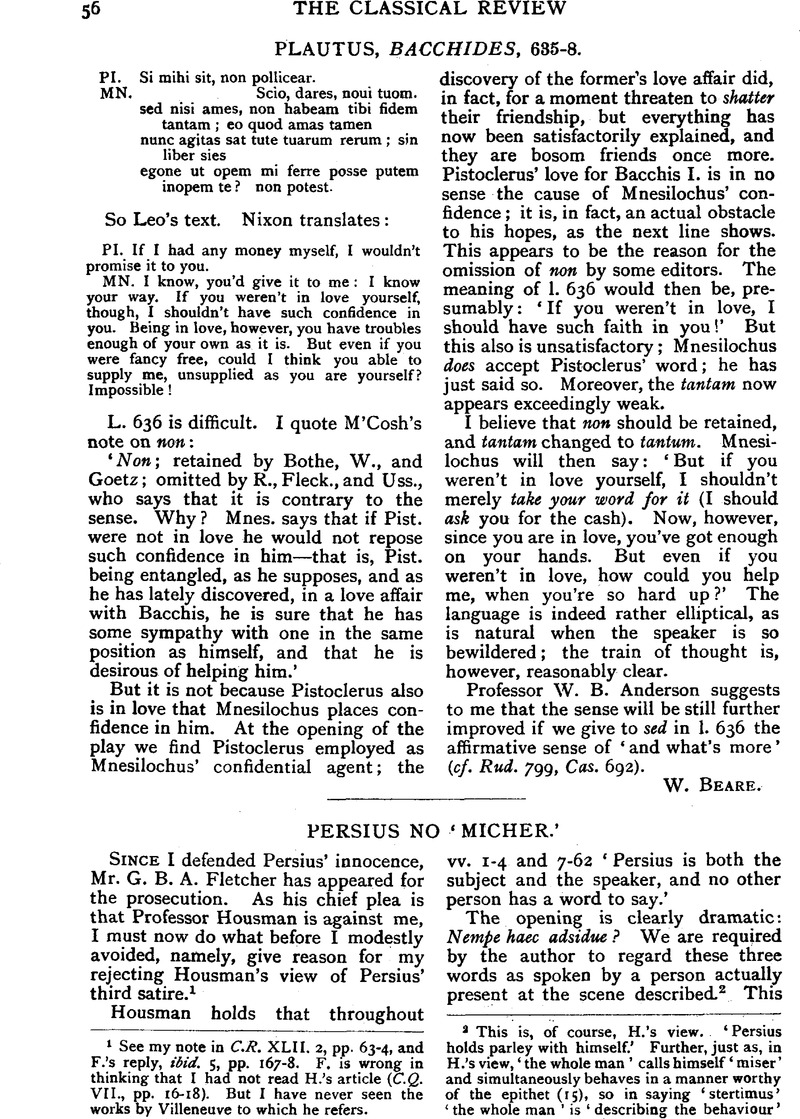No CrossRef data available.
Article contents
Abstract

Information
- Type
- Review Article
- Information
- Copyright
- Copyright © The Classical Association 1929
References
page 56 note 1 See my note in C.R. XLII. 2, pp. 63–4, and F.'s reply, ibid. 5, pp. 167–8. F. is wrong in thinking that I had not read H.'s article (C.Q. VII., pp. 16–18). But I have never seen the works by Villeneuve to which he refers.
page 56 note 2 This is, of course, H.'s view. ‘Persius holds parley with himself.’ Further, just as, in H.'s view, ‘the whole man’ calls himself ‘miser’ and simultaneously behaves in a manner worthy of the epithet (15), so in saying ‘stertimus’ ‘the whole man’ is ‘describing the behaviour’ of which he is guilty at the very time of the description.
page 57 note 1 So Hendrickson, G. L. (in Class. Phil., October, 1928, pp. 332 ff.)Google Scholar, who holds that ‘lam clarum … umbra’ is not part of the speech but ‘narrative description of the scene’—a view equally fatal to H.'s ‘rather fantastic identification.’ I owe my acquaintance with this article to the kindness of Mr. E. Harrison.
page 57 note 2 This is not, as H. thinks, a misunderstanding of vv. 3–4, which by themselves are ambiguous. It is a deduction from 3–4 combined with 58–59, where, just as stertis repeats the stertimus of 3, so oscitat hesternum naturally recalls the remark about sleeping off Falernian (3). In any case, oscitat hesternum proves that the paedagogus suspects the youth (apparently with justice) of having indulged in some sort of dissipation on the previous night.
page 57 note 3 Regard for truth alone compels me to insert this paragraph. For, granted that the youth is not the paedagogus, it would suit my case very well if the youth were identifiable with Persius himself. For it is the paedagogus, not the youth, who admits having played truant.
page 57 note 4 According to H., vv. 10–22 might themselves reveal the truth, being ‘a plain imitation of Hor. Serm. II. 3, 1–16, satire on the satirist's self.’ Those lines are placed by Horace in the mouth of Damasippus. Suppose Persius' youth were, as H. contends, Persius himself. Then who bears to Persius in this ‘plain imitation’ the relationship which Damasippus bears to Horace? The paedagogus, say I. Persius, says H.! There is indeed one sense in which ‘no one has a word to say but Persius.’ It is the sense in which no one has a word to say but Horace in the satire in question. It is the sense in which no one has a word to say in Macbeth but Shakespeare.
page 58 note 1 He should say ‘old boy’; for the paedagogus speaks, and there is no boy-part in the satire.
page 58 note 2 Common sense says no (supported by Quintilian I. I, 15 ff., and Mayor's note on Juvenal XIV. 10).
page 58 note 3 And the subject—an essay on suicide—implies that the lad's years were not so very tender.
page 58 note 4 Unless (as perhaps in his other uses of the singular number in this regard, ‘a speech,’ ‘the incident’) he thinks (on a priori grounds, and in defiance of saepe … tangebam) that the boy played truant only once!
page 58 note 5 Of school declamations there are two kinds, deliberative and forensic, suasoriae and controversiae. In C.R. XVII., p. 390, H. agrees with the scholiast that Cato's dying speech is a deliberative declamation—i.e. a suasoria. But he implies a distinction between (a) a suasoria the derivative sense (advice to Cato, verba Catoni dicere), and (b) a suasoria in the general sense of deliberative declamation (verba Catonis discere, a soliloquy of Cato). He means that Cato's dying speech is a suasoria in sense (b) and prefers the corresponding reading. He denies that it is a suasoria in sense (a). He does not deny that it is an exercise ‘in the school of a rhetor.’ (See also Mr. Owen's rejoinder to H. in C.R. XVIII., pp. 125 ff.)
page 58 note 6 Rhetorical studies began at ‘about sixteen’ (Wight Duff), ‘thirteen or fourteen’ (G. Boissier).
page 59 note 1 Lack of space has prevented me from exhausting in this note my objections to this view. I should have liked to deny, e.g. that the satire breaks in two at 62. On this question Hendrickson (op. cit.) should be consulted.
page 59 note 2 Regarding the question of probability, could Mr. Fletcher tell us the effect of lentssimi mores and exemplary filial piety (see Vita) on the miching propensities even of clever boys ?

